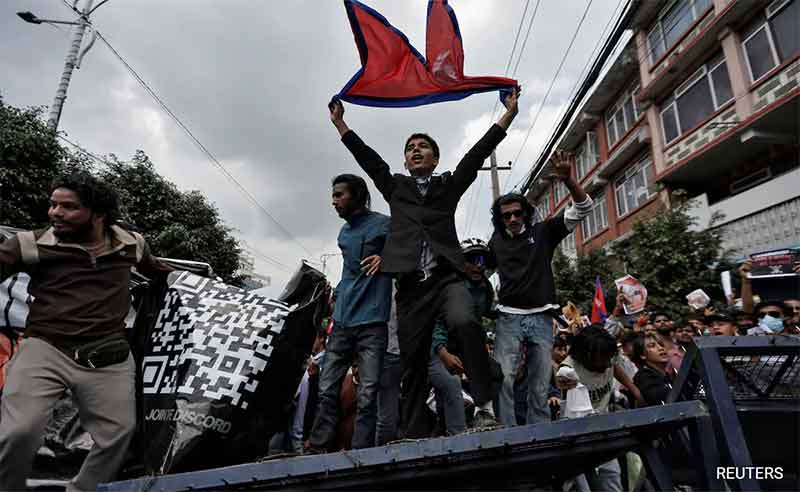Copyright countercurrents

Across continents, Gen Z has become the defining voice of protest politics – from Kathmandu to Antananarivo, Lima to Casablanca. In Nepal, youth mobilised against corruption and internet control; in Madagascar, they rallied against inflation and power cuts; in Peru, protests over pension reforms expanded into a movement against state opacity; and in Morocco, the “Gen Z 212” campaign voiced anger over joblessness and political stagnation. These movements are leaderless, digitally coordinated, and driven by frustration with extractionist economies that profit from instability. Platforms like TikTok and X (formerly Twitter) serve as both megaphones and meeting grounds, blurring the line between activism and performance. Yet this same hyperconnectivity often yields visibility without power, as protests are quickly absorbed into the attention economy. The Gen Z uprisings reveal a generation caught between hope and exhaustion, transforming alienation into fleeting solidarity while exposing the deep fractures of technocapitalism in the Global South. The post-war Baby Boomers and early Gen X in the Global South grew up in a world animated by the optimism of industrial modernity. In countries like India, Pakistan, Bangladesh, and Sri Lanka, the independent nation-state appeared as a collective project – a promise of progress and sovereignty. State-led industrialisation, public institutions, and developmental planning were imagined as the foundations of self-reliance. But this optimism began to falter by the 1980s. Structural adjustment and neoliberal reforms redefined citizenship as consumption and participation as entrepreneurship. Public ownership gave way to privatisation; the rhetoric of collective progress was replaced by the language of aspiration. Alienation, once confined to the workplace, began to seep into the social fabric. For Gen X, the loss of faith in the developmental state marked a new form of estrangement: a world where belonging was mediated through markets rather than shared ideals. The millennial generation entered adulthood in the age of digital expansion. The internet promised connection, transparency, and empowerment. In South Asia, this seemed revolutionary: young people could bypass traditional hierarchies, speak across borders, and build communities online. The digital public sphere appeared to democratise expression. Yet, this promise was short-lived. The public sphere was soon absorbed into platform capitalism – a system where visibility, communication, and even dissent were monetised. Corporate platforms transformed every interaction into data, every protest into content. What looked like participation was, in fact, extraction. This new digital dependency was not evenly distributed. In the Global North, institutions could buffer the disruptions of technocapital. In the Global South, where infrastructures were still fragile, the effects were devastating. South Asian governments increasingly relied on global tech giants for data management, surveillance, and political messaging. Sovereignty itself became outsourced. Alienation now extended beyond production and representation to the erosion of political agency. Gen Z grew up in a world where the distinction between reality and simulation had already collapsed. Screens became the dominant site of experience. In South Asia’s rapidly urbanising societies, this generation navigates global consumer aesthetics – following K-pop idols, gaming influencers, and digital activists with equal intensity. Baudrillard’s notion of simulacra – where the image replaces the real – finds full expression here. Politics, culture, and identity become performances, constantly circulating through algorithmic networks. The spectacle of protest, the aesthetics of dissent, and the commodification of outrage coexist seamlessly with everyday consumption. The result is a paradoxical condition: hypervisibility without power. Gen Z experiences political awareness, but primarily as mediated emotion. Solidarity becomes fleeting, measured in hashtags and trends. Their alienation is not from production, but from authenticity itself from the capacity to distinguish between lived experience and its digital double. As allegiance shifts from the nation-state to transnational online communities, the postcolonial idea of the nation as an “imagined community” begins to lose its hold. In its place arise fragmented, algorithmically curated publics – intensely connected yet politically dispersed. Emerging within this ecosystem, Gen Z embodies the contradictions of the digital era. Their consciousness is shaped by artificial intelligence, algorithmic feeds, and networked consumption. They inhabit a world of infinite simultaneity – where the global and the local, the political and the personal, constantly blur. In South Asia, Gen Z lives within what can be called an extractionist economy – a system that is fragile and durable at once. It is fragile because it depends on volatile flows of global capital, foreign debt, and data infrastructure. Yet it is durable because technocapitalism converts every disruption into profit. Even crisis becomes content; dissent becomes monetised engagement. This duality is evident across the region. The debt-fuelled collapse of Sri Lanka’s economy, India’s repeated financial protests, or Pakistan’s political volatility all expose the precarity of the postcolonial state. But they also reveal how quickly these crises are absorbed into the global spectacle of technocapital. The system endures by commodifying its own breakdown. The nation-state, in this context, becomes an interface – a broker between global finance, corporate platforms, and local populations. Governance is mediated through data dashboards, digital welfare portals, and algorithmic policing. Citizenship is recoded as access, and belonging becomes transactional. The alienation of Gen Z, therefore, is total: they are estranged not only from labour and meaning, but from the very notion of sovereignty. While the Global North experiences technocapital’s alienation as a slow corrosion of meaning, the Global South endures it as a rapid erosion of political and economic stability. In South Asia, the speed of this transformation is staggering. Digital infrastructures are largely imported. Platforms headquartered in Silicon Valley or Seoul now mediate communication, finance, and governance in Delhi, Dhaka, or Colombo. As a result, the region’s digital modernity is exogenous – superimposed upon older colonial hierarchies. The new alienation thus compounds the old: the psychic dislocation of postcolonialism merges with the algorithmic capture of technocapitalism. Recent upheavals across South Asia illustrate this accelerated fragility. In Sri Lanka, mass protests over debt and inflation exposed the vulnerability of economies built on extractive tourism and remittances. In India, farmers’ and students’ movements have revealed how corporate consolidation and digital surveillance reshape public dissent. Yet, these movements also show the system’s resilience: protest itself becomes a form of data, feeding the very platforms that structure the crisis. The result is a new kind of state – fragile in autonomy but durable in exploitation. It survives not by resolving contradictions, but by circulating them through digital infrastructures. The Global South’s nation-states remain both subordinate to global technocapital and complicit in its expansion. If each generation represents a stage in the life of capitalism, Gen Z marks its critical threshold. Theirs is a consciousness born from collapse – a sensibility that perceives both the emptiness of simulation and the possibility of resistance within it. Unlike previous generations, Gen Z does not believe in the purity of the “real.” Their politics emerges from remix, irony, and subversion. They weaponise digital languages – memes, fandoms, performances – to express critique. Across South Asia, new hybrid solidarities are taking shape: fan communities mobilising for climate justice, queer collectives reimagining citizenship, and youth movements articulating ecological grief through art and sound. Yet, these gestures must go beyond expression to transformation. Awareness alone cannot counter alienation unless it reclaims agency from the infrastructures of technocapital. To do so, Gen G must understand how power hides within connectivity – how platforms translate empathy into engagement, and engagement into profit. The challenge, then, is to convert glitches – the cracks in the digital order – into acts of refusal. By exposing the conditions of simulation, Gen Z can begin to reinvent solidarity not as nostalgia for the nation, but as a post-digital ethics of interdependence. From the industrial age to the digital present, alienation has deepened in step with the evolution of capitalism. In the Global South, where colonial histories persist through economic dependency and technological asymmetry, this alienation now manifests as a crisis of sovereignty itself. The South Asian nation-state today is no longer a stable container of identity or development. It is a fragile interface – sustained by the very corporate networks that erode its autonomy. The more the state digitises itself, the more it becomes subject to the logic of technocapital, trading legitimacy for efficiency and belonging for access. Gen Z inherits this contradictory world: hyperconnected yet precarious, globally aware yet locally estranged. Within their alienation lies the seed of critique. If they can recognise simulation as both condition and weapon, they may yet transform disillusion into disruption. The future of the Global South depends on this act of awareness – on whether the next generation can turn the glitch into a new grammar of resistance, capable of imagining solidarity beyond both nation, algorithm, and network. Samir Karmakar is based at Kolkata and can be reached through samir.krmkr@gmail.com.



